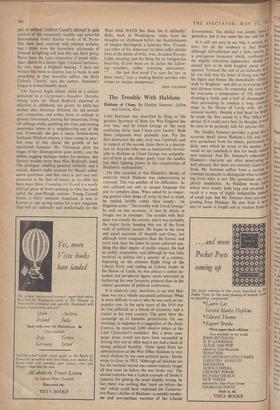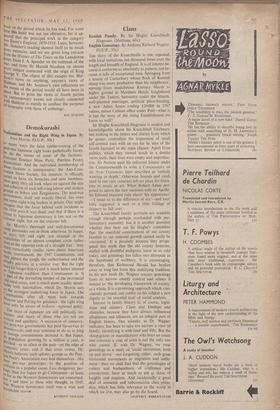The Trouble With Haldane
LORD HALDANE was described by Haig as 'the greatest Secretary of State for War England has ever had,' and by Lloyd George as 'the most confusing clever man I have ever known.' Both these judgments were probably true. For the first distinction his Only rival was Cardwell; and in support of the second claim there is a descrip- tion by Asquith (who was as instinctively favour- able to Haldane as Lloyd George was antipathe- tic) of how at one dinner party 'even the candles lost their lighting power in the complexities of Haldane's explanations.'
On this occasion it was Einstein's theory of relativity which Haldane was endeavouring to expound. This was another of his difficulties : he was addicted not only to opaque language but also to complex ideas. When asked by an inquir- ing general what shape of army he had in mind, he replied, briefly rather than simply: 'an Hegelian army.' The trouble with Lloyd George,' he said on one occasion, 'is that he thinks in images not in concepts.' The trouble with Hal- dane was exactly the reverse, and it was probably the major factor keeping him out of the front rank of political success. He began as the close and equal associate of Asquith and Grey, but although more imaginative than the former and more able than the latter he never achieved any- thing like their degree of public impact. He had no public magnetism; and although he was fully involved in politics for a quarter of a century, beginning on the extreme Right wing of the Liberal Party and ending as Labour leader in the House of Lords, he was always a rather de- tached and peripheral figure, more interested in furthering his own favourite projects than in the central questions of political controversy.
It is relatively easy, therefore, to see why Hal- dane was not a wholly successful politician. What is more difficult to see is why he was such an un- popular one. In the early years of the 1914 war he was pilloried as a friend of Germany and a traitor to his own country. The press blew the
campaign up to fantastic proportions. On one morning, in response to a suggestion of the Daily Express, he received 2,600 abusive letters at the
Lord Chancellor's residence. But a press cam- paign alone would not have been successful in driving him out of office had it not had a basis of strong political hostility. 'Quite apart from his administration at the War Office Haldane is very much disliked by my own political party,' Derby wrote to Grey in 1915. 'Although all hatchets are for the moment buried one cannot entirely forget all that went on before the war broke out.' The second sentence was a typical example of Derby's capacity for getting the point slightly wrong. In fact there was nothing that 'went on before the war' which could have explained the Conserva- tive Party's dislike of Haldane—a notably moder- ate and non-partisan member of the Liberal
Government. The dislike was simply based '1,1 prejudice, but it was none the less real for IN' It is still not easy to see why it existed, ever, for all the evidence is that Halal although self-sufficient and a little remote, 111 a courageous buoyancy which, combined his slightly ridiculous appearance, should caused him to be both laughed about and 't spected. Towards the end of an elaborate din° r he was told that his habit of living was bad P.0 his figure and fitness. He immediately offered' walk to Brighton—and did so in evening C1t)th, and thirteen hours. In somewhat the same Si he overcame a temperature of 102 degrees drinking a bottle and a half of champagne 3"e then proceeding to conduct a long comtnit.1,, stage in the House of Lords with, for hr unusual lucidity. Despite a bad head for hei811,I; he made the first ascent in a War Office aerio device. If it could carry him, he thought. it 00 be seen to be perfectly safe for anyone else.
t
Mr. Dudley Sommer provides a great dea, accurate detail about Haldane's life and Otehr: sive quotations from his letters, particularly b's daily ones which he wrote to his mother. As, result we are indebted to him for much valuo; new material. And Mr. Sommer's reflections 5 Haldane's character are often penetrating well phrased. But there are certainly faults to O'et book. Mr. Sommer suffers from a curious constant incapacity to distinguish what is intere5' ing from what is not. His quotations are cogl" pletely unselective. As Haldane wrote lette1,,0 which were mostly both long and involved, result is a mass of highly indigestible passagj of small type. But Mr. Sommer does not stOP 3 quoting from Haldane. He also finds it neces; sary to quote at length and at random from 311' book on the period which he has read. For some time this habit was not too obtrusive, for it ap- peared that the principal work in the category was Ensor's England, 1870-1914. Later, however, Mr. Sommer's reading showed itself to be much
inore extensive, and we are given long extracts from
3 the History of The Times on the Lansdowne letter, from J. A. Spender on the outbreak of the war, and from Sir Harold Nicolson on almost every subject connected with the reign of King George V. The, object of this escapes me. Hal- 'lane's views on anything, anyone's views of lialdane, and Mr. Sommer's own reflections on the events of the period would all have been in Place. But to print the Views of fourth parties Oh, contemporary events not closely connected With Haldane is merely to confuse the purposes Of biography with those of anthology.
ROY JENKINS





































 Previous page
Previous page